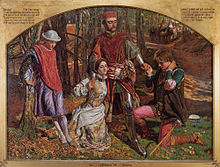Two gentlemen from Verona

The Two Gentlemen of Verona (Engl. The Two Gentlemen of Verona ) is a comedy by William Shakespeare . The work is about the two friends Valentin and Proteus and their love for Julia and Silvia. The story takes place in the 16th century in the northern Italian cities of Verona, Milan and near Mantua. It is an early work and was probably made around 1590/91. The main source is the prose romance Los siete libros de la Diana by the Portuguese poet Jorge de Montemayor from 1559. The only authoritative text version can be found in the First Folio from 1623. The work is first mentioned in Francis Meres' Palladis Tamia from 1598 and the first documented performance dates from 1762. It is seldom performed to this day and is not very well regarded among scholars.
action
The two childhood friends Valentin and Proteus are the two gentlemen from Verona . Valentin leaves the city and travels to Milan to find happiness at the court of the Duke of Milan. Proteus initially stays in Verona because he loves Julia and does not want to leave her. But his father tells him to leave for the court in Milan the next day. When they say goodbye, he and Julia exchange rings.
At the court of Milan, Valentin falls in love with Silvia, the duke's daughter; but the arrived Proteus also falls in love with her. He forgets Julia and woos Silvia, who is supposed to marry the rich courtier Thurio. In order to secure the duke's favor, Proteus reveals to the duke that Valentin wants to kidnap Silvia. The Duke then banished Valentin from Milan. Meanwhile, Julia, disguised as a boy, has gone to Milan to meet Proteus. There Silvia disdains Proteus' vows of love. This now orders Sebastian, the disguised Julia, to bring his ring (received from Julia) to Silvia.
The exiled Valentin is attacked in a forest between Milan and Mantua by robbers who are exiled just like him. When they learn his story, they are so impressed that they want to make him their leader, which Valentin basically declares himself ready to do. Silvia sets out to find Valentin. Proteus, Sebastian, the Duke and Thurio set out for their part to find Silvia. In the forest, Silvia is seized by the outlaws and brought to her leader. When Proteus and Sebastian arrive there, Valentin explains that he is giving Silvia Proteus, whereupon Sebastian faints. Sebastian then shows two rings: the one he was supposed to deliver to Silvia and the one that Proteus gave Julia, and identifies himself as Julia. Proteus then chooses Julia; Valentin wins the duke's favor and the hand of his daughter. - Speed and Lanz, the lackeys of the two noblemen and the silly courtier Thurio provide the necessary humor in the piece.
Text output
- Total expenditure
- Charlton Hinman (Ed.): The Norton Facsimile. The First Folio of Shakespeare. Based on the Folios in the Folger Library Collection. New York 1996, ISBN 0-393-03985-4 .
- John Jowett, William Montgomery, Gary Taylor, and Stanley Wells (Eds.): The Oxford Shakespeare. The Complete Works. Oxford University Press, Oxford 2005, ISBN 0-19-926718-9 .
- William Shakespeare. Complete Works. English German. Zweiausendeins Frankfurt 2010, ISBN 978-3-86150-838-0 .
- English
- Clifford Leech (Ed.): William Shakespeare: The two Gentlemen of Verona. The Arden Shakespeare. Second series. 1969, ISBN 0-17-443581-9 .
- William C. Carroll (Ed.): William Shakespeare: The two Gentlemen of Verona. Arden Third Series. London 2004/2007, ISBN 978-1-903436-95-0 .
- Kurt Schlueter (Ed.): William Shakespeare: The two Gentlemen of Verona. New Cambridge Shakespeare. Cambridge University Press, Cambridge 1990/2012, ISBN 978-0-521-18169-3 .
- Roger Warren (Ed.): William Shakespeare: The two Gentlemen of Verona. Oxford Shakespeare. Oxford University Press, Oxford 2008, ISBN 978-0-19-283142-2 .
- German
- Sylvia Zysset (Ed.): William Shakespeare: Two Gentlemen of Verona. English-German study edition. Stauffenburg, Tübingen 2008, ISBN 978-3-86057-569-7 .
- Frank Günther (Ed.): William Shakespeare: Zwei Herren aus Verona / The Two Gentlemen of Verona. Ars vivendi, 2001, ISBN 3-89716-164-8 .
literature
- AD Cousins: Shakespeare. The Essential Guide to the Plays. Buffalo 2011, ISBN 978-1-55407-928-5 .
- Hans-Dieter Gelfert : William Shakespeare in his time. CH Beck Verlag, Munich 2014, ISBN 978-3-406-65919-5 .
- Ina Schabert (Ed.): Shakespeare Handbook. Time, man, work, posterity. 5th, revised and supplemented edition. Kröner, Stuttgart 2009, ISBN 978-3-520-38605-2 .
- Ulrich Suerbaum : The Shakespeare Guide. 3rd, corrected and supplemented edition. Reclam, Stuttgart 2015, ISBN 978-3-15-020395-8 .
- Stanley Wells , Gary Taylor : William Shakespeare: A Textual Companion. corrected new edition. Oxford University Press, Oxford 1997, ISBN 0-393-31667-X .
Web links
- Two Gentlemen of Verona English text after the Arden edition on MIT server.
- The two Veronese German text after the Schlegel-Tieck edition on Zeno-Org.
Individual evidence